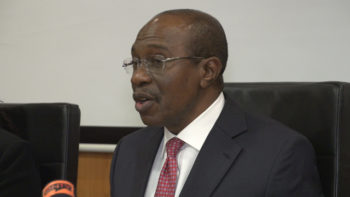
Central Bank of Nigeria (CBN) Governor, Godwin Emefiele, on Tuesday said that the country would be out of recession in the second quarter or first half of the third quarter this year. He also vowed to sustain the apex bank’s intervention in the foreign exchange market to stabilise the value of the naira.
Emefiele spoke after emerging from a closed session with Senate President, Bukola Saraki, in Abuja.
The CBN boss who said that the Senate President called them to brief and give update to Senate on foreign exchange market, noted that the country’s foreign reserve currently stood at $31 billion.
He said that the increasing strength of the foreign reserve is giving the CBN the necessary firepower to play in the foreign exchange market.
“You will all have observed that in the last two months, Central Bank has been involved in some form of intensive intervention in the foreign exchange market and this has fortunately resulted in a downward trend in the parallel market price of foreign exchange from as higher as N525 to as low as N370. Right now it hovers between N370 to N380.
“I think it’s an opportunity for me to say that we are going to continue this intervention because the reserve looks very good as I speak to you our reserve stands at above $31 billion and that provides us enough of firepower or ammunition to be able to defend the currency and we will do so with all intensity to ensure that foreign exchange is procured by everybody.
“You want to import raw materials, you will get foreign exchange, you want to import plant and equipment you will get foreign exchange, you want to pay school fees or you are a small business that wants to buy foreign exchange for you to import your small items you will procure foreign exchange.
“And indeed we have started to see a downward trend even in prices and you have also must observe that inflation is also trending downward.
“We are very much optimistic that by the end of the second quarter very latest third quarter we should be out of recession that we are in right now.
“I think what is important is that last week we brought out an announcement which is meant to encourage our foreign investor community to get involved as well in the foreign exchange market.
“It is the market or window that is opened for them to inflow their foreign exchange and come into the market on what we called a willing buyer, willing seller basis in which case there will be no form of any price intervention by anybody and indeed even including the Central Bank.
“Indeed with the kind of firepower that we have we are also going to play in that market to ensure that as the prices move on based on the managed float regime that we run that we should be able to control the price based on willing buyer and willing seller basis.
“And we believe on willing buyer, willing seller basis, foreign investors, exporter, non-exporters can come into that market and off load their capital and in doing so, we expect to see a lot of liquidity in that market and as we see much of liquidity in that market, we are very much optimistic that we are going to see high level of convergence we are hoping for,” Emefile stated.
Chairman, Senate Committee on Banking, Insurance and other Financial Institutions, Senator Rafiu Ibrahim, who was at the meeting, on his part said that the Senate is happy with the CBN policy direction.
He said that the Senate would continue to support the apex bank in its policy direction to attract more foreign direct investment into the country.
Ibrahim said, “As usual the leadership of the Senate is always engaging the most important sectors of our economy. So, we had discussion with the Senate President and the Governor of CBN, and we were briefed just as he has given you the overview of the meeting.
“That is what we are doing now. We will proffer more solutions, which will result in more policy direction very soon because the major import of this kind of meeting is to attract foreign direct investment. So that the economy will be intact and intervention will be sustainable.”
Copyright Ships & Ports Ltd. Permission to use quotations from this article is granted subject to appropriate credit given to www.shipsandports.com.ng as the source.
